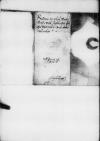Letter #2841
Marco de la TORRE to Ioannes DANTISCUSCracow (Kraków), 1545-06-14
English register: Marco de la Torre is feeling consistently worse, so he is unable to reply to Dantiscus’ letter. He anticipates imminent death — he will surely only meet with Dantiscus in the next world. He thanks him for the fortifying substances he has sent and for his kindness. He asks that the same kindness be shown to his Provincial (minister), an honest and learned man [Francesco Lismanino].
| received Heilsberg (Lidzbark Warmiński), 1545-06-26 Manuscript sources:
Auxiliary sources:
| ||||||||||
Text & apparatus & commentary Plain text Text & commentary Text & apparatus
Reverendissimo in Christo Patri, Domino, domino
Reverendissime in Christo Pater et Domine, domine observandissime.
Post animi mei devotionem et perpetuam felicitatem.
Quoniam in malis casibus et periculo vitae meae constitutus sum, ideo cf.
Pro ea animi propensitate , qua me prosequitur, et ea, quae ad restaurationem virium mearum pertinent, subministrare satagit, habeo Paternitati Vestrae Reverendissimae maximas gratias, licet non desint multa restaurantia, quibus neque uti possum, cum nutrientibus magis opus habeam. Idcirco rogo Paternitatem Vestram Reverendissimam, ut eam benevolentiam(!), quam erga me forte exhibere non poterit, ea amplecti dignaretur reverendum
Valeat Paternitas Vestra Reverendissima sospes in utroque homine.
Datae
Eiusdem Paternitatis Vestrae Reverendissimae obsequentissimus frater

